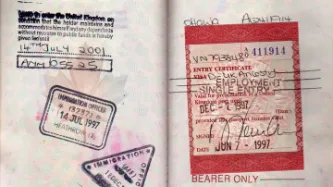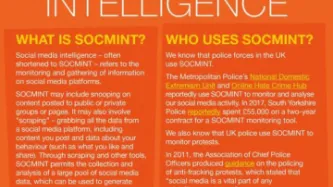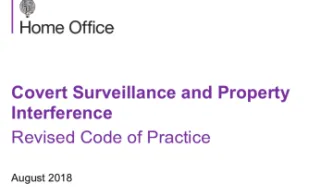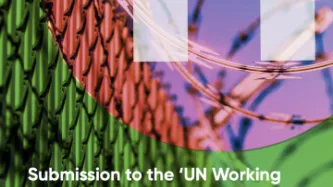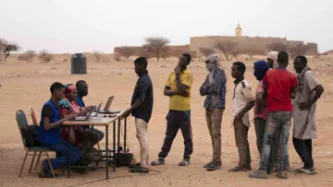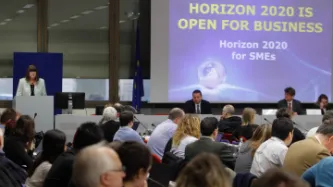Search
Content type: Examples
The findings of Freedom from Torture’s report, based on reviews of transcripts of asylum interviews carried out by the Home Office in 2017 or 2018 and a series of focus groups and interviews involving 25 torture survivors who had attended asylum interviews, shows they were often prevented from giving a full account of their experiences or denied the opportunity to explain their evidence.
The report states that some Home Office case workers were found to employ “poor questioning technique” and…
Content type: Examples
Up to 30 charities and organisations have written to home secretary Priti Patel calling for a number of amendments on Tuesday - a year exactly until the scheme ends.
Under current arrangements, EU citizens have been told to apply by June if they wish to continue living and working in Britain.The letter said: “We are concerned that the government has not taken appropriate steps or made the adequate adjustments to the EUSS necessary to protect EU citizens and family members from Covid-19. We…
Content type: Case Study
The EU have been using foreign aid budgets, not to lift people out of poverty, but to export surveillance technologies used to repress people’s human rights all over the world.
A wave of anti-immigration fervour has swept across Europe in recent years. As leaders have come to power across Europe either on anti-immigration platforms or having to respond to an anti-immigration sentiment, the EU’s recent policies have been shaped by the drive to stop migration to Europe.
Surveillance…
Content type: Long Read
What Do We Know?
Palantir & the NHS
What You Don’t Know About Palantir in the UK
Steps We’re Taking
The Way Forward
This article was written by No Tech For Tyrants - an organisation that works on severing links between higher education, violent tech & hostile immigration environments.
Content type: Examples
Although the Home Office does not record ethnicity data for detainees, analysis of nationalities of those recently held within the immigration detention estate found that citizens from countries with predominantly black and brown populations are held for substantially longer periods than those from predominantly white countries.
Around a third – approximately a 1,000 – being held in immigration detention centres were freed at the height of the coronavirus pandemic to try and stop the spread of…
Content type: Examples
Immigration rules that have left 1 million migrant workers in the UK at risk of destitution because they cannot claim universal credit should be suspended on public health grounds during the pandemic, a cross-party group of MPs has recommended.
The work and pensions select committee said the no recourse to public funds (NRPF) rule – which hit the headlines recently when Boris Johnson appeared not to be aware of its existence – meant many foreign nationals faced a choice of staying at home in…
Content type: Examples
Excluded groups such as sex workers and asylum seekers are being left behind in the UK’s COVID-19 response as control measures amplify existing health inequalities and put life-saving advice and care further out of reach.
The closure of services and some GP registrations, a lack of access to technology, distrust and fear of authorities, unsuitable or insecure accommodation, and reduced income are among the many challenges facing people in vulnerable circumstances in England.
Doctors of…
Content type: Advocacy
Privacy International (PI), Fundaciòn Datos Protegidos, Red en Defensa de los Derechos Digitales (R3D) and Statewatch responded to the call for submission of the UN Special Rapporteur on contemporary forms of racism, xenophobia and related intolerance on how digital technologies deployed in the context of border enforcement and administration reproduce, reinforce, and compound racial discrimination.
This submission provides information on specific digital technologies in service of border…
Content type: Long Read
There are few places in the world where an individual is as vulnerable as at the border of a foreign country.
As migration continues to be high on the social and political agenda, Western countries are increasingly adopting an approach that criminalises people at the border. Asylum seekers are often targeted with intrusive surveillance technologies and afforded only limited rights (including in relation to data protection), often having the effect of being treated as “guilty until proven…
Content type: Advocacy
Last week, Privacy International joined more than 30 UK charities in a letter addressed to the British Prime Minister Boris Johnson, following his recent declaration, asking him to lift No Recourse to Public Funds (NRPF) restrictions.
Since 2012, a ‘NRPF condition’ has been imposed on all migrants granted the legal right to live and work in the UK. They are required to pay taxes, but they are not permitted to access the public safety net funded by those taxes.
This is not a topic we are known…
Content type: Case Study
In the UK, asylum seekers cannot claim benefits. Some of them are entitled to an ASPEN card, a pre-paid payment card that allocates them a weekly sum of money. Most of them are allowed to use it the way we would use any debit card. But people, whose applications have been refused but who cannot return to their countries, aren’t allowed to withdraw cash. That means that every single payment they make can be monitored by the Home Office.
Evidence has started emerging that this monitoring has led…
Content type: Long Read
It is common for families with no recourse to public funds who attempt to access support from local authorities to have their social media monitored as part of a ‘Child in Need’ assessment.
This practice appears to be part of a proactive strategy on the part of local authorities to discredit vulnerable families in order to refuse support. In our experience, information on social media accounts is often wildly misinterpreted by local authorities who make serious and unfounded allegations…
Content type: Report
It is common for families with no recourse to public funds who attempt to access support from local authorities to have their social media monitored as part of a 'Child in Need' assessment. This practice appears to be part of a proactive strategy on the part of local authorities to discredit vulnerable families in order to refuse support. In our experience, information on social media accounts is often wildly misinterpreted by local authorities who make serious and unfounded allegations…
Content type: Explainer
Social media platforms are a vast trove of information about individuals, including their personal preferences, political and religious views, physical and mental health and the identity of their friends and families.
Social media monitoring, or social media intelligence (also defined as SOCMINT), refers to the techniques and technologies that allow the monitoring and gathering of information on social media platforms such as Facebook and Twitter which provides valuable intelligence to others…
Content type: Long Read
Dear Sir/Madam,
Freedom of information act request
RE: Social media monitoring / social media intelligence
FOIA REQUEST
For definition of social media intelligence please see background explanation below. We further note the comments of the Office of Surveillance Commissioners Annual Report 2016 cited below.
1. In 2016 the Rt Hon Lord Judge, then Chief Surveillance Commissioner, wrote to all Local Authorities regarding use of social media in investigations. Please confirm whether you are…
Content type: Long Read
Online covert activity
3.10 The growth of the internet, and the extent of the information that is now available online, presents new opportunities for public authorities to view or gather information which may assist them in preventing or detecting crime or carrying out other statutory functions, as well as in understanding and engaging with the public they serve. It is important that public authorities are able to make full and lawful use of this information for their statutory purposes. Much…
Content type: Long Read
The Chief Surveillance Commissioner, The Rt Hon Sir Christopher Rose’s Annual Report 2011 - 12 did not refer to social networks but to overt investigations using the internet as a surveillance tool, stating that:
“5.17 A frequent response to my Inspectors’ enquiries regarding a reduction in directed surveillance is that ‘overt’ investigations using the Internet suffice. My Commissioners have expressed concern that some research using the Internet may meet the criteria of directed…
Content type: Advocacy
Privacy International sent a letter to the Investigatory Powers Commissioner’s Office (IPCO) addressing social media monitoring carried out by Local Authorities.
The submission builds on a campaign and research carried out by PI highlighting the growth of social media monitoring across Local Authorities, as well as the general lack of internal oversight for some of these activities. After providing an introduction to the research and the findings, the letter highlights each of PI’s concerns…
Content type: Advocacy
Privacy International responded to the call for submissions of the Working Group on the use of mercenaries as a means of violating human rights and impeding the exercise of the rights of peoples to self-determination on role of private military and security companies in immigration and border management and the impact on the protection of the rights of all migrants.
This submission builds on PI’s research and reporting highlighting examples of the involvement of private companies in…
Content type: Examples
The travel bans and border controls instituted to prevent the spread of COVID-19 jeopardise refugees’ access to international protection, bringing the right to leave any country and seek asylum into direct collision with the human right to life.
Source: https://www.kaldorcentre.unsw.edu.au/publication/covid-19-travel-bans-right-seek-asylum-when-you-cannot-leave-your-homeland
Writer: Kate Ogg
Publication: Kaidor Centre
Content type: Explainer
In a scramble to track, and thereby stem the flow of new cases of Covid-19, Governments around the world are rushing to track the locations of their populace. One way to do this is to leverage the metadata held by mobile service providers (telecommunications companies - "Telcos" - such as Hutchison 3 (Also known as Three), Telefonica (Also known as O2), Vodafone, and Orange) in order to track the movements of a population, as seen in Italy, Germany and Austria, and with the European Commission…
Content type: Advocacy
To the Members of the European Parliament and to the Committee on Budgets of the European Parliament
The EU urgently needs to step up and provide assistance to protect the health and safety of people trapped in camps on the Greek islands - not just to protect their welfare, but to contain the virus itself as a matter of global public health.
However, as we detail in the briefing below, the current European Commission proposal for funds allocation is insufficient to ensure the safety of…
Content type: News & Analysis
Amid calls from international organisations and civil society urging for measures to protect the migrant populations in Greece and elsewhere, last week, the European Commission submitted a draft proposal to amend the general budget 2020 in order to, among other measures, provide assistance to Greece in the context of the COVID-19 outbreak.
Both at the Turkish-Greek border and in the camps on the Greek islands, there are severe concerns not only about the dire situation in which these people…
Content type: Examples
On March 14 a group of immigrant advocacy groups wrote to the government asking for the Home Office to release all 1,500 to 2,000 detainees in order to protect them from a coronavirus outbreak in the UK's seven removal centres and two short-term holding centres.. On March 21, the Home Office said it had released 300 of the detainees. The charity Detention Action launched a legal action to compel the Home Office to release the most vulnerable detainees and test all detainees. The Home Office…
Content type: Advocacy
The letter has been signed by more than 40 organisations and it is open for individuals to sign.
At the moment, the Department of Health and Social Care has given no assurance that NHS data will not be shared with the Home Office and used for immigration enforcement, including for those people with a confirmed coronavirus diagnosis.
Assurances which were confirmed by the Irish government as part of their response to COVID-19: last week, during a Parliamentary debate, Irish Minister of Health…
Content type: Case Study
There are 29.4 million refugees and asylum seekers across the globe today. These are people who have fled their countries due to conflict, violence or persecution seeking protection in safer environments.
People have protected those in need fleeing from dire situations since antiquity. However, over recent years, European countries have become increasingly hostile towards refugees - treating them as criminals instead of people in need.
In 2017, German authorities passed a…
Content type: Long Read
Commercial interests seem to often overshadow the EU’s stance as a global privacy leader. After looking at Europes's shady funds to border forces in the Sahel area, Niger's new biometric voting system, and attempts to dismantle smugglers networks powered by Europe's gifts of surveillance, freelance journalist Giacomo Zandonini looks at the battle for data protection and digital rights in the continent.
What do a teenage labourer on a marijuana farm in Lesotho, a…
Content type: Advocacy
TEDIC, InternetLab, Derechos Digitales, la Fundación Karisma, Dejusticia, la Asociación por los Derechos Civiles y Privacy International acogen el llamado de la Relatoría Especial sobre Derechos Económicos, Sociales, Culturales y Ambientales (DESCA) de la Comisión Interamericana de Derechos Humanos (CIDH) de enviar información para la elaboración del Informe Anual sobre DESCA del año 2019, que se presentará ante la Organización de los Estados Americanos (OEA) en 2020.
El objeto de este…
Content type: Long Read
It was a quiet evening in Agadez, a bustling Saharan city in the centre of Niger. Thirty-five year old Agali Ahmed was sipping tea at a friend’s place, as he often did, when he received a message: police were at his uncle’s house. When he got there, Ahmed saw men in plainclothes, standing around the building’s gate. Inside, more men were searching the apartment. Three white men, who Ahmed guessed were Spanish, asked for his phone and started taking pictures of him. They told him to follow them…
Content type: Long Read
The European Union (EU) spends billions on research and development aimed at driving economic growth and jobs, as well as furthering the bloc’s broader agenda. Within the current budget, known as Horizon 2020 and covering the years 2014-2020, some €80 billion has been made available for research in a huge number of areas, ranging from finding cures for diseases to helping keep the earth viable for life.
From the same budget, it also funds a lot of projects aimed at developing surveillance…




